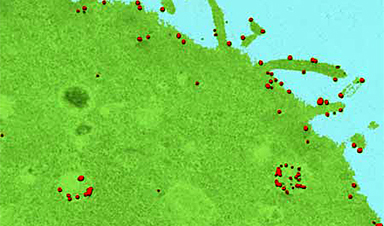With targeted drug and gene therapies, finding the target cells is only half the battle. Once these agents reach a cell’s surface, they still have to get inside and do their job.
University of Illinois researchers say they now know how to track and map drug and gene delivery vehicles to evaluate which are most effective at infiltrating cells and getting to their targets, insight that could guide development of new pharmaceutical agents. The researchers described their tracking system and their findings on the most effective delivery vehicles in the journal Nature Communications (“Single quantum dot tracking reveals the impact of nanoparticle surface on intracellular state”).
Gene therapies have shown promise in cell culture and animal studies but have been less effective in clinical trials, said study leader Andrew Smith, a professor of bioengineering at the U. of I. This class of pharmaceuticals, called biologics, are different from traditional drugs in that they need to be attached to specialized delivery agents, such as nanoparticles or proteins, to reach their intended cellular targets.
Their lack of efficacy stems from their difficulty in reaching targets within cells, and the obstacles hampering them are poorly understood, Smith said.
“We have these really great models that tell us how classical drugs work, but there’s no model that works for these new biologics that have to have some additional mechanism to deliver to cells. This has been a key missing part of pharmaceutical medicine,” Smith said. “If we don’t understand the mechanisms of the problem, we can’t solve it. Now we can pinpoint why that happens and figure out how to overcome the key bottlenecks, which has never been possible.”
Image Credit: Andrew Smith
News This Week
Nano-Enhanced Hydrogel Strategies for Cartilage Repair
A recent article in Engineering describes the development of a protein-based nanocomposite hydrogel designed to deliver two therapeutic agents—dexamethasone (Dex) and kartogenin (KGN)—to support cartilage repair. The hydrogel is engineered to modulate immune responses and promote [...]
New Cancer Drug Blocks Tumors Without Debilitating Side Effects
A new drug targets RAS-PI3Kα pathways without harmful side effects. It was developed using high-performance computing and AI. A new cancer drug candidate, developed through a collaboration between Lawrence Livermore National Laboratory (LLNL), BridgeBio Oncology [...]
Scientists Are Pretty Close to Replicating the First Thing That Ever Lived
For 400 million years, a leading hypothesis claims, Earth was an “RNA World,” meaning that life must’ve first replicated from RNA before the arrival of proteins and DNA. Unfortunately, scientists have failed to find [...]
Why ‘Peniaphobia’ Is Exploding Among Young People (And Why We Should Be Concerned)
An insidious illness is taking hold among a growing proportion of young people. Little known to the general public, peniaphobia—the fear of becoming poor—is gaining ground among teens and young adults. Discover the causes [...]
Team finds flawed data in recent study relevant to coronavirus antiviral development
The COVID pandemic illustrated how urgently we need antiviral medications capable of treating coronavirus infections. To aid this effort, researchers quickly homed in on part of SARS-CoV-2's molecular structure known as the NiRAN domain—an [...]
Drug-Coated Neural Implants Reduce Immune Rejection
Summary: A new study shows that coating neural prosthetic implants with the anti-inflammatory drug dexamethasone helps reduce the body’s immune response and scar tissue formation. This strategy enhances the long-term performance and stability of electrodes [...]
Scientists discover cancer-fighting bacteria that ‘soak up’ forever chemicals in the body
A family of healthy bacteria may help 'soak up' toxic forever chemicals in the body, warding off their cancerous effects. Forever chemicals, also known as PFAS (per- and polyfluoroalkyl substances), are toxic chemicals that [...]
Johns Hopkins Researchers Uncover a New Way To Kill Cancer Cells
A new study reveals that blocking ribosomal RNA production rewires cancer cell behavior and could help treat genetically unstable tumors. Researchers at the Johns Hopkins Kimmel Cancer Center and the Department of Radiation Oncology and Molecular [...]














Leave A Comment